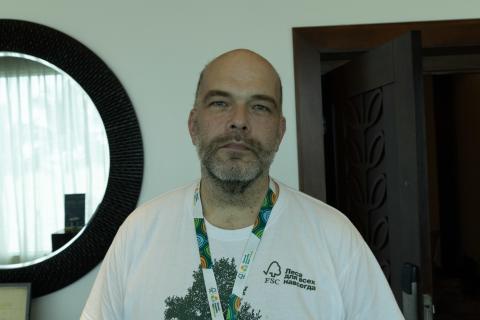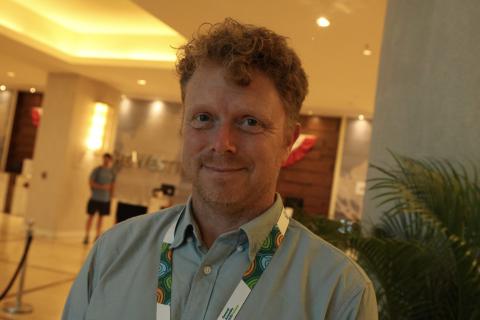FSC General Assembly 2014: key outcomes
As the FSC General Assembly 2014 unfolded, the temperature went up and down, perhaps reflecting the emotional state of the participants. Despite discords, there was consensus that FSC needs to modernise, to enhance its reach and to improve its credibility. Read this summary of highlights to understand where FSC is heading.
“I’ve been approached by members from the North asking for colder temperatures and by members from the South who asked for temperatures to be warmer. I’ve therefore given secret instructions to the temperature people and I’ll let you know what that was later,” said John Ramsay, who facilitated the FSC General Assembly (GA) for the seventh time with his usual humour and eloquence. The event took place during 7-14 September 2014 in the Spanish city of Seville.
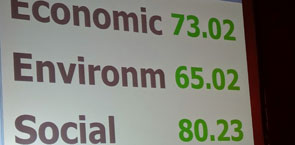 The GA voting sessions were conducted according to FSC’s elaborate rules to ensure equal influence by its three chambers – the Economic, the Environmental and the Social chamber.
The GA voting sessions were conducted according to FSC’s elaborate rules to ensure equal influence by its three chambers – the Economic, the Environmental and the Social chamber.
Minimum 50% of the voting members from each chamber must attend to achieve quorum, i.e. for the voting to be legitimate. These figures are continuously shown on monitor screens.
Special rules apply to discussions as well.Each speaker has a maximum of 2 minutes, and both supporters and opponents get the chance to speak.
The audience itself decides when to break off the discussion. “We will now have a vote on whether to proceed to a vote”, Mr Ramsay was heard saying many times.
FSC to trim and streamline
Cold or hot, FSC needs to slim down. That was the clear message coming across from the assembled members.
Growing complexity and frequent system changes have reached a tipping point where stakeholders are struggling to cope. Certificate holders in particular need the system to be more stable and less complex, however the problem affects all stakeholders. For example, many feel flooded by the recent avalanche of FSC consultations.
Certificate holders in particular need the system to be more stable and less complex, however the problem affects all stakeholders. For example, many feel flooded by the recent avalanche of FSC consultations.
In addition, simpler rules and procedures are needed in order to get smallholders, communities and indigenous peoples on board.
The current level of complexity and the related costs are causing social imbalance in the FSC system and are preventing FSC’s expansion into the massive land areas managed by those groups.
This situation has created a common wish for FSC to simplify and reduce red tape wherever possible, as reflected in a large proportion of this year’s motions.
Two motions (84 and 42) addressing overall issues of governance and strategy were passed with an overwhelming majority of votes. Both motions are important in streamlining the FSC system, by explicitly addressing efficiency issues and by pinpointing key issues that FSC needs to focus on very strongly.
Economic Chamber: A heartfelt wish fulfilled
This clear push to streamline the system fulfils an earnest wish particularly among FSC’s Economic Chamber members. The two other chambers also clearly saw the need to support system efficiency.
Many certificate holders will be pleased to hear that there are simpler trademark rules and procedures ahead. A strong case was put forward that the FSC system is wasting precious resources on micro-managing trademark requirements. This does little to protect system integrity whilst causing major frustration among certificate holders. The members passed motion 29 which asks FSC to simplify its rules and to move away from case-by-case approval. 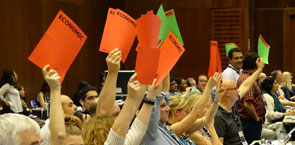 Another motion proposed by members of the Economic Chamber asked for a ‘green lane’ for PEFC products under the FSC Controlled Wood system. This was rejected by all three chambers.
Another motion proposed by members of the Economic Chamber asked for a ‘green lane’ for PEFC products under the FSC Controlled Wood system. This was rejected by all three chambers.
An interesting proposal for FSC to expand its reach to cover the growing area of Urban Forestry was not approved.
Its opponents agreed with its intent but were concerned about ensuring sufficient resources for FSC’s other priority tasks over the coming three years. Thus the idea is likely to remain on the table and may stand a better chance in the future.
Social Chamber makes it mark
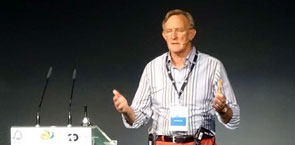 During the event, Mr Ramsay had ample opportunity to demonstrate his facilitation talent, which includes an impressive steadfastness and the ability to handle anything from jokes to stormy situations.
During the event, Mr Ramsay had ample opportunity to demonstrate his facilitation talent, which includes an impressive steadfastness and the ability to handle anything from jokes to stormy situations.
The most contentious issue turned out to be Motion 35, requesting the ILO (International Labour Organisation) conventions to be more effectively integrated in the FSC system.
Whilst the motion’s opponents supported the ILO conventions as such, they objected to its specific wording and took the Social Chamber to task for not reaching out to other chambers, which might have resolved the issues. Others noted that the Social Chamber is under-resourced for the inter-chamber negotiations that always precede the General Assembly itself.
When the motion was voted down, disgruntled Social Chamber members walked out, leaving the room without quorum. The voting was put on hold until they came back, which they fortunately chose to do. The message was clear: The Social Chamber is resolved to make their mark on the FSC system.
FSC’s General Director Kim Carstensen underlined that FSC remains committed to the ILO conventions and made a vow that workers’ rights will be on the table during the coming years.
The Social Chamber subsequently moved on to score several victories, as motions were passed to move smallholders’ and indigenous peoples’ issues up on the FSC agenda. (Motions 11, 83, 96)
Environmental Chamber victories
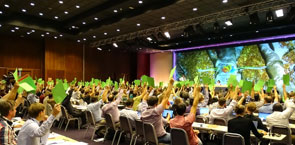 The Environmental Chamber rejoiced as several of their key motions were passed:
The Environmental Chamber rejoiced as several of their key motions were passed:
- FSC shall explore how to improve protection of Intact Forest Landscapes. This is a key issue for Greenpeace and other environmental NGOs, and the passing of this motion was hailed by the conservation community. (motion 65)
- FSC shall explore a new take on forest conversion and the rule excluding forests converted after 1994 from FSC certification. In effect the rule causes social injustice and hinders FSC from expanding and influencing a large part of the world’s plantations. (Motion 12)
- FSC shall ensure a higher degree of transparency and consistency in assessment and auditing reporting, ensuring consistent quality and allowing watchdog organisations and other stakeholders to compare their quality. (Motion 45)
These are topics that sit very high on the Environmental Chamber’s agenda.
In total, 19 motions were passed, 13 were rejected, and the course appears set for FSC’s development over the next three years. See the outcome of the FSC General Assembly 2014 voting
Find a wealth of information including news, opinion & analysis, videos and live streaming at http://ga2014.fsc.org.
The Rainforest Alliance and NEPCon assisted FSC in producing daily news and reports from the event, and in addition contributed the following opinion pieces:
To save the forests, FSC must save itself
FSC trademarks: Simplify standards, boost the brand
Where is the FSC in the new deforestation debate?
Rebooting FSC - a fresh perspective


